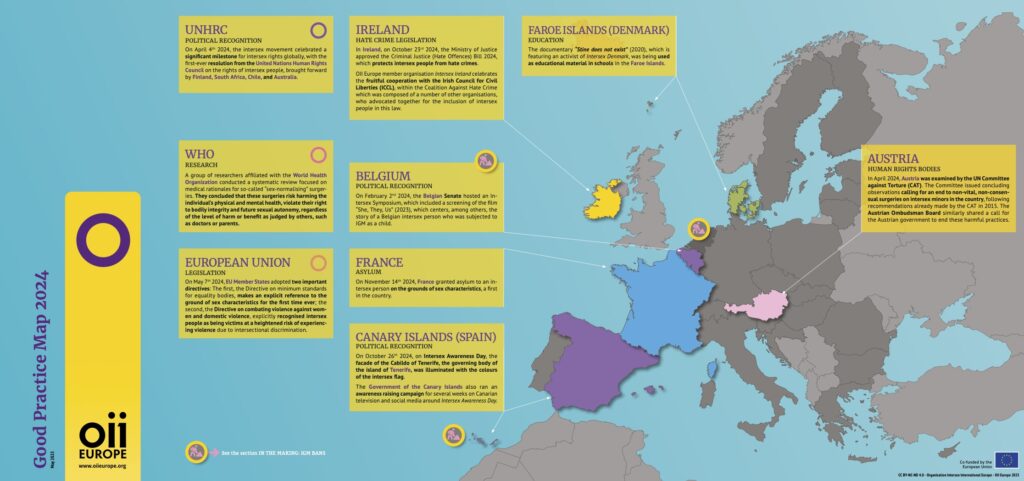Press Release – Launch of the Good Practice Map 2024
Today, on the 15th of May 2025, OII Europe is happy to present the publication of its Good Practice Map 2024! The map highlights some key advancements achieved in 2024 towards the better protection of intersex human rights across Europe.
The 2024 Good Practice Map once again features the section “In the Making: IGM Bans”. This year, we feature news about some steps being taken towards new IGM ban legislation, as well as the implementation of already adopted bans. In addition, this year’s map presents good practice examples related to human rights bodies, education, asylum, research, hate crime/legislation, and political recognition.
“The year 2024 provided positive examples of how governments can listen to the voices of intersex communities at national level, to better understand and take concrete legislative action to protect their rights”, adds Kristian Ranđelović, Co-Chair of OII Europe. “In Ireland, the Ministry of Justice approved a criminal law reform that protects persons targeted by hate crime because they are intersex, by including sex characteristics as a protected ground in the Hate Offences Bill. In Belgium, we saw the Senate host an Intersex Symposium, featuring a screening of a film following an intersex person who was subjected to IGM as a child, as well as a roundtable with human rights lawyers and representatives from civil society, which is an important step of political recognition from a governmental body”
“We also saw how other key institutions such as equality bodies can work hand in hand with intersex organisations to advance intersex rights at national level. In Austria, VIMÖ-OII Austria and the Austrian Ombudsman Board provided evidence and shared a call to end non-vital, non-consensual surgeries on intersex minors in the country during the examination of Austria by the UN Commitee against Torture (CAT),” says Belgin Günay, OII Europe Steering Board member. “Their contributions were taken into account by CAT, and the process ended with the Committee issuing concluding observations calling for the end of these harmful practices. This exemplifies why it is so crucial for intersex-led organisations to be heard by human rights bodies.”
“Raising awareness about the violations that intersex people face and their everyday lived realities remains one of the key priorities of our movement, especially in the area of education, where combating discrimination and fostering inclusion starts. We are pleased to hear that a documentary called “Stine does not exist” featuring a Danish intersex activist was being used as educational material in schools in the Faroe Islands”, says Magda Rakita, Co-Chair of OII Europe. “In Tenerife, in the Canary Islands, authorities displayed strong commitment to enhancing the visibility of intersex people, as well as raising awareness of the human rights violations they faced by illuminating the city in the intersex pride flag colours, as well as running campaigns on social media and television.”
“Although we are living in a time of extreme backlash against intersex and LGBTQ rights within our Union, we have also simultaneously seen important advancements at EU-level, which show that decision makers confirm the necessity of protecting intersex people as a specifically vulnerable group, including on a ground that explicitly addresses the specific kinds of human rights violations they face,” adds Maddalena Bianchi, Policy Officer of OII Europe, “The adoption of two key EU Directives marked a landslide moment for our movement: the Equality Bodies Directive, which included the first-ever reference to the ground of sex characteristics (Article 6) in a piece of binding EU legislation; the EU Directive on combating violence against women and domestic violence explicitly acknowledged intersex victims as being at a heightened risk of violence.”
“In 2024 we once again saw the important role that commitments and calls to action from international and regional bodies play in advancing intersex rights across Europe and beyond. We saw the publication of key research by academics affiliated with the World Health Organisation (WHO) which focused on reviewing medical rationales behind so-called “sex normalising” surgeries, and which calls for the end of these harmful interventions, says Kaisli Syrjänen, Treasurer of OII Europe. “Furthermore, substantial and groundbreaking work to recognise the harmful practices impacting the lives of intersex people came from the international level. On April 4th 2024, the first-ever resolution from the United Nations Human Rights Council on the rights of intersex people was adopted. It includes among other things the commission of a report from the Office of the High Commissioner for Human Rights documenting the situation of intersex people throughout the world”.
“It is no secret that we are living in turbulent times, where our communities are under attack and face increased levels of violence. For some intersex persons, the levels of intolerance they face are so severe that they are forced to flee their homes and seek safety elsewhere. This is a reality we have to face, and as OII Europe we have been working to raise awareness about the specific challenges and vulnerabilities of intersex asylum seekers and refugees, via the publication in 2024 of our Intersex Refugees & Asylum Seekers Toolkit, adds Jana Hugo, Policy Officer of OII Europe, “We therefore highly commend France for granting asylum to an intersex person on the grounds of sex characteristics, thereby setting an important precedent for explicitly recognising the forms of discrimination and violence that intersex people face.”
“The developments in the past seven years that we have been publishing our Good Practice Map have shown that there is an increasing political will to abolish IGM: in the past year, we saw important steps be taken in Belgium and The Netherlands towards IGM ban legislation. In the Canary Islands, Spain, the revision of the medical protocols relating to intersex healthcare advanced steadily, marking the key next step to implementing the 2021 Trans & Intersex Law,” says Dan Christian Ghattas, Executive Director of OII Europe, “All these advancements collectively point towards a movement – slowly but surely, towards the better protection of intersex persons’ right to bodily integrity and self-determination across the EU, albeit in a particularly challenging political context. It is key that we do not lose the achievements of 2024 and of the past years to misinformation, hate and prejudice and politicians and policy makers have an essential role to play in this.”
In these times of backlash and increased violence, funding for the intersex movement has also been severely impacted, including from US funding cuts. Now more than ever, intersex organisations and activists are operating with scarce resources. To ensure continuity and sustainability of activities, new funding sources must be found urgently. We urge EU and national policymakers to provide financial support to intersex and LGBTIQ organisations, to uphold human rights and democratic values in the face of increased attacks on the core foundations of our societies.
* END *
Downloads:
Content of the Good Practice Map 2024
Human Rights Bodies
In April 2024, Austria was examined by the UN Committee against Torture (CAT). The Committee issued concluding observations calling for an end to non-vital, non-consensual surgeries on intersex minors in the country, following recommendations already made by the CAT in 2015. The Austrian Ombudsman Board similarly shared a call for the Austrian government to end these harmful practices.
VIMÖ – OII Austria submitted a shadow report to the Committee, and participated in the NGO briefing session with the CAT, outlining the continuation of these surgeries.
This good practice example highlights:
- The important role that Ombudspersons can play in helping to achieve intersex equality by echoing calls to protect the bodily integrity of intersex people.
- The importance of intersex-led organisations being heard by human rights mechanisms.
VIMÖ report: https://vimoe.at/wp-content/uploads/2024/04/UN_Public_Final-1.pdf
Ombudsman report: https://tbinternet.ohchr.org/_layouts/15/treatybodyexternal/Download.aspx?symbolno=INT%2FCAT%2FNHS%2FAUT%2F57968&Lang=en
Education
In 2024, Intersex Denmark was informed that the documentary they participated in the making of, entitled “Stine does not exist” (2020), featuring one of their activists, was being used as educational material in schools in the Faroe Islands. The documentary follows an intersex activist around Pride, thereby raising awareness about the challenges they face.
This good practice example highlights that:
- Awareness raising material that centers personal testimonies increases understanding among adults and youth alike.
- Raising awareness about intersex lived realities in schools is crucial to combating discrimination and fostering inclusion.
Documentary: https://www.tvsyd.dk/ovrige-udsendelser-pa-tv-syd/stine-findes-ikke
Legislation
On May 7th 2024, the Council of the EU adopted two legislative proposals setting minimum standards for equality bodies. One of the two directives, for the first time ever in EU legislation, makes an explicit reference to the ground of sex characteristics (Art. 6). This inclusion acknowledges the fact that persons experience discrimination on the ground of their sex characteristics, and ensures that intersex people will be included in the scope of the work done by equality bodies at national level.
On May 7th 2024, the EU Member States adopted the Directive on combating violence against women and domestic violence. The Directive, for the first time in history, explicitly recognises intersex people as being among victims at a heightened risk of experiencing violence due to intersectional discrimination.
This good practice example highlights that:
- Intersex people and the ground of “sex characteristics” are being more and more explicitly recognised in binding EU legislation.
- Legislative bodies confirm the necessity to protect intersex people as a specifically vulnerable group, including on a ground that addresses the specific kind of human rights violations they face.
Equality Bodies Directive: https://eur-lex.europa.eu/eli/dir/2024/1500/oj/eng
Violence Against Women Directive: https://eur-lex.europa.eu/eli/dir/2024/1385/oj/eng
Asylum
On November 14th 2024, France granted asylum to an intersex person on the grounds of sex characteristics, a first in the country. This sets an important precedent for explicitly recognising the specific forms of discrimination and violence that intersex people face, and which often underpins their decision to flee their country of origin, in combination with other factors.
This good practice example highlights that:
- Recognising the specific forms of violence and persecution faced by intersex people, due to having a variation of sex characteristics, is an important factor in ensuring their protection.
Political Recognition
On February 2nd 2024, the Belgian Senate hosted an Intersex Symposium, which included a screening of the film “She, They, Us” (2023), which centers, among others, the story of a Belgian intersex person who was subjected to IGM as a child. The Symposium also featured a roundtable which included a human rights lawyer and representatives from Belgian civil society.
On October 26th 2024, on Intersex Awareness Day, the facade of the Cabildo of Tenerife, the governing body of the island of Tenerife, was illuminated with the colours of the intersex flag. 14 other public buildings in the city of Santa Cruz, at the initiative of the City Council, displayed banners commemorating October 26. This milestone in terms of visibility was achieved following awareness raising from Caminar Intersex to the President’s office and training given to all 1800 employees of the Cabildo. The lightning of the facade will from now on take place every year on October 26. The Government of the Canary Islands also ran an awareness raising campaign for several weeks on Canarian television and social media around Intersex Awareness Day.
On April 4th 2024, the intersex movement celebrated a significant milestone for intersex rights globally, with the first-ever resolution from the United Nations Human Rights Council on the rights of intersex people, brought forward by Finland, South Africa, Chile, and Australia. The resolution was passed with 24 votes in favour, 23 abstentions and no votes against. 11 Council of Europe Member States of the Human Rights Council voted for the resolution.
These good practice examples highlight that:
- Intersex rights are human rights.
- International human rights bodies are willing to further investigate “discriminatory laws and policies, acts of violence and harmful practices” against intersex persons across the globe.
- The outcome of the vote is a statement to how much the understanding and knowledge of intersex issues has significantly grown in Europe and across the world in the past decade; incl. as a result of the efforts of intersex organisations and their allies.
- Raising awareness at national level for human rights violations intersex people face is key to help achieving intersex rights incl. at international level.
Awareness raising video from the Government of Canary Islands:
https://www.instagram.com/reel/DBlKRDtKQex/?igsh=dXVmZThnN2MyeGVz
UN coalition statement:
https://www.oiieurope.org/united-nations-addresses-the-human-rights-of-intersex-persons-in-ground-breaking-resolution/
UN HRC resolution: https://docs.un.org/A/HRC/55/L.9
Hate Crime Legislation
In Ireland, on October 23rd 2024, the Ministry of Justice approved the Criminal Justice (Hate Offences) Bill 2024, which protects intersex people from hate crimes. The bill includes provisions that protect persons targeted because of certain characteristics, including sex characteristics, including in the context of crimes aggravated by hatred of those characteristics. OII Europe member organisation Intersex Ireland celebrates the fruitful cooperation with the Irish Council for Civil Liberties (ICCL), within the Coalition Against Hate Crime which was composed of a number of other organisations, who advocated together for the inclusion of intersex people in this law.
This good practice example highlights that:
- “Sex characteristics” is increasingly mainstreamed as the appropriate protective ground across Europe.
- Cooperation between intersex organisations and national institutions are vital to ensure the protection of intersex people from discrimination.
Hate Offences Bill:
https://data.oireachtas.ie/ie/oireachtas/act/2024/41/eng/enacted/a4124.pdf
Press release:
https://www.gov.ie/en/press-release/a597e-minister-mcentee-welcomes-passing-of-hate-crime-legislation-by-oireachtas/
Research
In August 2024, a group of researchers affiliated with the World Health Organization conducted a systematic review focused on medical rationales for so-called “sex-normalising” surgeries. They concluded that these surgeries risk harming the individual’s physical and mental health, violate their right to bodily integrity and future sexual autonomy, regardless of the level of harm or benefit as judged by others, such as doctors or parents. It is the first time that such a strong call for the end of these interventions is made by prominent global medical experts.
This good practice example highlights that:
- The harmful nature of IGM is being more and more recognised globally, including by medical professionals.
- Fundamental rights, including bodily integrity, must be at the center of medical decision-making processes.
Research: https://journals.plos.org/globalpublichealth/article?id=10.1371%2Fjournal.pgph.0003568
IN THE MAKING: IGM Bans
On February 22nd 2024, Belgian MP Sarah Schlitz (Greens) brought forward a draft proposition for a bill entitled “safeguarding the physical and psychological integrity and bodily autonomy of persons with variations in sex characteristics.” The bill aims to protect intersex minors from non-consensual, medically unnecessary surgeries or interventions, as well as setting out certain comprehensive obligations for healthcare professionals. Following the introduction of this draft legislation, a coalition of intersex organisations went to Parliament in November 2024 to advocate MPs to advance the bill.
In 2024, positive steps were taken in the Netherlands towards banning non-consensual, non-emergency medical interventions on intersex persons. In May, a first motion was passed by the Dutch House of Representatives on the rights of intersex people, calling on the government to do everything in its power to stop IGM. In November, a second motion called on the competent Ministries to start the lawmaking process banning these interventions, which passed with overwhelming majority.
In 2024, important advancements were made in the Canary Islands, Spain regarding the implementation of the 2021 Trans & Intersex Law, which includes a revision of the medical protocols relating to intersex healthcare. OII Europe’s member organisation Caminar Intersex worked closely with a multidisciplinary team of doctors, endocrinologists, geneticists, paediatricians, neonates, social workers, primary care doctors and other health care professionals in the development of the new protocols for intersex people and their families.
BE Draft legislation: https://www.dekamer.be/kvvcr/showpage.cfm?section=flwb&language=nl&cfm=/site/wwwcfm/flwb/flwbn.cfm?dossierID=0077&legislat=56&inst=K
NL First motion: https://www.tweedekamer.nl/kamerstukken/moties/detail?id=2024Z08672&did=2024D20380
NL Second motion: https://www.tweedekamer.nl/kamerstukken/moties/detail?id=2024Z18675&did=2024D44569
ES Trans & Intersex law: https://www.boe.es/diario_boe/txt.php?id=BOE-A-2021-11382

IGM Ban Indicator Checklist
The indicators aim to give policy makers and law makers a useful tool when preparing legislation to prohibit intersex genital mutilation and to establish comprehensive legal protection of the right to bodily integrity and self-determination of intersex people. They were developed based on analyses of existing IGM laws and consultation with intersex civil society across Europe about the essential elements that constitute a ban.




